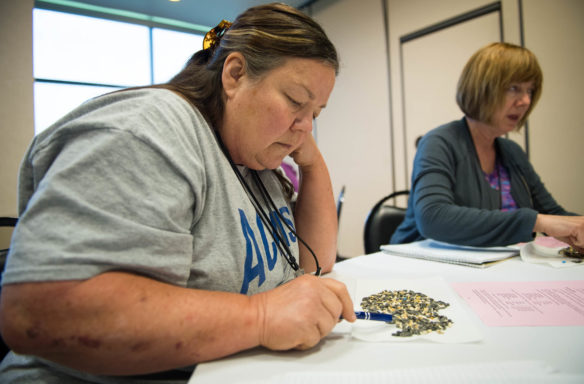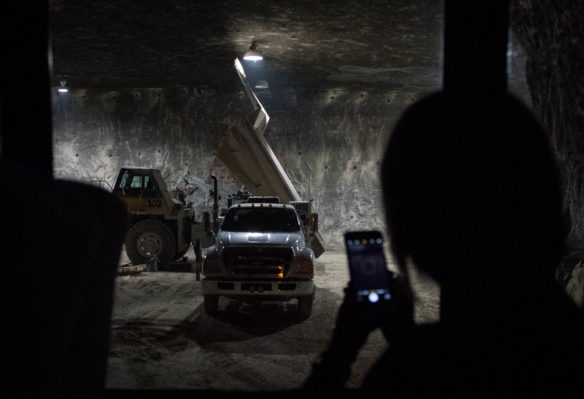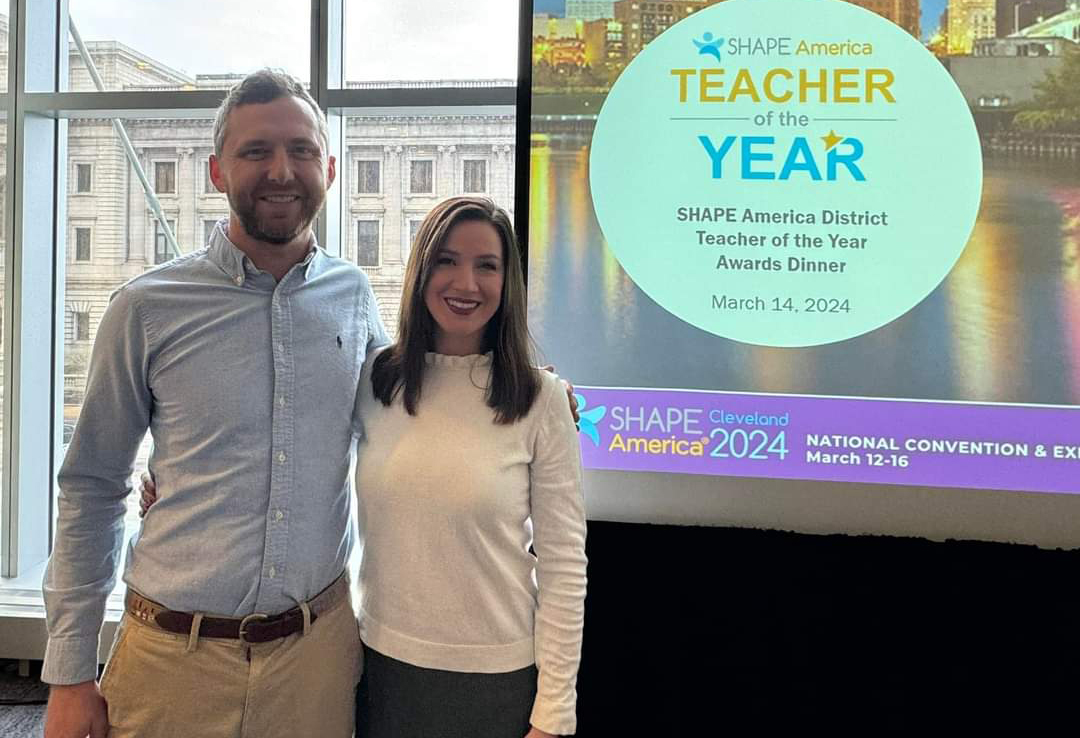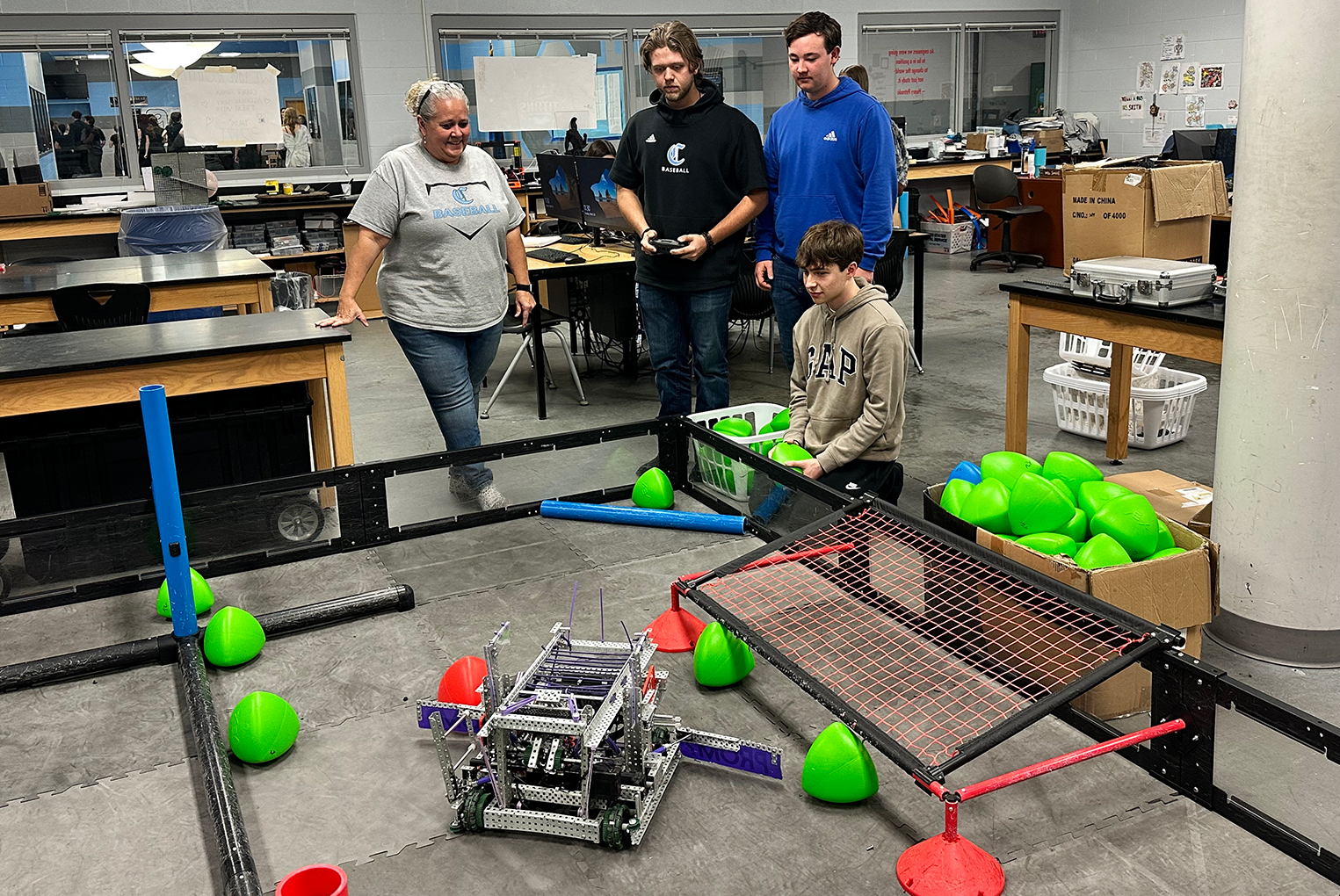
Deborah Hensley, an 8th-grade science teacher at Adair Couty Middle School, sorts through birdseed to find beads as part of a lesson used to demonstrate more sustainable mining techniques during the Kentucky Crushed Stone Association teachers’ workshop. The workshop was revived after a one-year absence, with an emphasis on providing lessons aligned with Kentucky standards.
Photo by Bobby Ellis, June 21, 2017
By Mike Marsee
mike.marsee@education.ky.gov
A hundred feet or so below the surface of the earth, Deborah Hensley was putting together a lesson plan.
Hensley, an 8th-grade science teacher at Adair County Middle School, was on a bus with 20 or so fellow teachers who were getting a guided tour of a limestone mine as part of a teachers’ workshop conducted by the Kentucky Crushed Stone Association (KCSA). The experience was one of several from the free two-day workshop that she said she can put to good use in her classroom.
She can’t bring her students into the mine, but she can use her experience there and the materials she gleaned from the workshop as the bedrock for several lessons.
“I can take all of this information right back and start building my lesson plans and my units,” Hensley said. “My students will have real-life events that they can relate to their local community and that could impact their careers.”
That’s what Nick Rodgers had in mind when he retooled the KCSA workshop, which was canceled last year due to a lack of interest after being held for nine consecutive years. Rodgers, the executive director of the nonprofit association that support’s Kentucky’s aggregates industry, wanted to create a professional learning experience that educators could – and would – use.
Rodgers worked with the Kentucky Department of Education (KDE) for help in creating a program that was both interesting and useful.
“We reached out to the department of education to really help us market this program and make sure this program matched the Kentucky standards,” he said. “They analyzed our program and made sure teachers are getting value out of the program.”
Sean Elkins, an earth science consultant at KDE, said he helped Rodgers match the content with the appropriate standards.
“We made sure that he was aware of the current standards, and he told me in a general sense what they would be doing,” Elkins said. “Based on what he told me, I gave him some suggestions to look at particular standards that might be the most relevant.”
Elkins said KDE consultants are occasionally asked for help from outside entities planning professional learning workshops.
“I applaud them for trying to make sure that what they’re doing is relevant, and I’m hopeful that the teachers walked away with the same sense, that they thought this was something that was relevant to the standards and to their interests,” he said.
Jonathan Huether, a biology and agriscience teacher at Bullitt East High School (Bullitt County), said as much.
“It’s very rare to see a content-based PD. Teachers need this kind of stuff. They need to learn, too,” Huether said.
Teachers took a bus tour of the Harrod Concrete and Stone Co. mine in Frankfort, a two-level quarry that has produced stone for more than 40 years. They also got the chance to operate some of the equipment that can be used to move rocks.

Sara Lainhart, a science teacher at Randall K. Cooper High School (Boone County), takes a picture of a truck drilling a blasting hole in the roof of the mine at Harrod Concrete and Stone Co. in Frankfort. Teachers got a tour of the mine as part of the Kentucky Crushed Stone Association’s teacher workshop.
Photo by Bobby Ellis, June 21, 2017
A representative from the Kentucky Geological Survey (KGS) gave the teachers background on the state’s geology and explained the resources that KGS offers. There also were discussions on the uses of aggregates and the process of mining them and making them useable, as well as hands-on demonstrations of lessons the teachers could use.
Retta Wilhite, a 6th-grade science teacher at Bourbon County Middle School, said what she learned will help her students learn as well.
“I got an understanding of how integral all these components are to daily life, and I can use that to teach my students that this is real, everyday life. It’s not just something that’s in a classroom on a standard,” Wilhite said.
Hensley said the program also was valuable because it gave educators a great deal of material at no cost to them.
“It is useable material, I don’t have to beg anybody for it, and I don’t have to have funds for it,” she said.
Teachers left with a large box that contained everything from lesson materials to raw materials. Rodgers said it was designed to give teachers a wealth of information about aggregates and the geology concerning them that they could pass along to their students.
“It’s a learning toolbox, and it will allow them to schedule lesson plans for several weeks on geology and stone. We give them a jar full of various sizes of different-sized stones, and many of them are what they saw being extracted at the quarry,” he said.
Hensley said the lessons she left with will help her fill some gaps that middle school and high school teachers in their district recently discovered in their curriculum.
Becky Duda, a 6th- and 8th-grade science teacher at Heath Middle School (McCracken County), said she learned a great deal that she can pass on to her students.
“I really appreciate knowing how the mining industry works and realizing the importance of limestone, since it’s Kentucky’s bedrock and so important to us,” Duda said.
Hensley said the workshop lit a fire under her.
“I come to a conference like this, and I’m ready to go home and get right back into the classroom and get the kids excited again,” she said. “Here, I felt like I’ve been valued, with all these people catering to me and asking what they can do for our students.”
MORE INFO …
Becky Duda rebecca.duda@mccracken.kyschools.us
Deborah Hensley deborah.hensley@adair.kyschools.us
Jonathan Huether jonathan.huether@bullitt.kyschools.us
Retta Wilhite retta.wilhite@bourbon.kyschools.us
Sean Elkins sean.elkins@education.ky.gov
Nick Rodgers nick@kycsa.org



[…] Kentucky standards,” says Nick Rodgers, executive director of KCSA, in an article that appears in Kentucky Teacher, a KDE publication. “They analyzed our program and made sure teachers are getting value out of […]